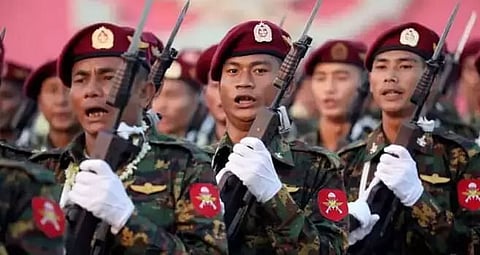
- Home
- Live Blog
- Breaking News
- Top Headlines
- Cities
- NE News
- Sentinel Media
- Sports
- Education
- Jobs

KOLKATA: Myanmar military commanders posted along the borders of Northeast India are using separatist rebels from the region to attack refugees fleeing the Pagoda Nation after the February 1 coup.
Senior Indian intelligence officials told IANS the local Tatmadaw (military) commanders have struck a deal with Manipuri rebel groups, UNLF and PLA, to carry out such attacks.
"This may not be national policy but a tactical move by local commanders desperate to stop refugee flow into India. The deal is the UNLF and PLA factions with bases in Myanmar's Sagaing province will attack the refugee stragglers walking towards the Indian border and force them to return to their villages," a senior official said on the condition of anonymity.
"In turn, the Tatmadaw has assured the rebels they will not attack the PLA-UNLF bases inside Sagaing."
Burmese opposition sources told IANS that at least 12 refugees have been killed by the PLA and UNLF insurgents in the Tamu region in the last one month. Four members of a family were among those victims.
The Tatmadaw had started operating against the northeast Indian rebel bases in Sagaing.
Myanmar had for the first time handed over to India 22 activists of rebel groups from the Northeast.
Nearly 3,000 Burmese nationals have taken shelter in Mizoram and Manipur after the February 1 military takeover in Myanmar, where firings by security forces has so far led to more than 700 deaths with five times more injured.
A dozen lawmakers elected to Parliament in the November 2020 polls are among those who had escaped into Indian territory.
Some journalists have also fled, among them staffers of Mizzima, one of whose director Thin Thin Aung has been detained by the military.
Thin Thin is also the president of the Burma's Women League and her husband Soe Myint is the chief editor of Mizzima.
The military coup in Myanmar has compelled many people of the neighbouring country to take shelter in the "no man's land" along the India-Myanmar border near Manipur's Moreh town.
These people, who have fled from Myanmar due to atrocities in their country, are seeking refuge in Manipur and give shelter inside the Indian territory.
As per reports, more than 1,000 Myanmar citizens have fled to India after the military coup.
A media report quoted police saying that over 100 Myanmar nationals tried to flee to India through Moreh's borders on Monday.
It has been reported that over 30 families were seeking help for their stay near Border Pillar No 79 at Moreh.
But they were stopped by the Indian security forces at the international border.
"Yesterday, some Myanmar nationals had tried to sneak into the Indian side, but security personnel had pushed back them. Many Myanmar nationals are trying to enter Manipur," the report quoted Tengnoupal superintendent of police in Manipur, Th Vikramjit Singh, as saying on Tuesday.
The police officer said some of the Myanmar nationals may have already entered Manipur because a large part of the India-Myanmar border is forest area.
He said more security forces personnel have been engaged along the Indo-Myanmar border areas.
More than 300 Myanmar nationals have already entered Manipur and are taking shelter in hillside areas, the report quoted locals of Moreh town as saying.
The report quoted a villager of Moreh as saying: "Following the violent situation in Myanmar, many people from the Tamu area in Myanmar have fled and entered Manipur by crossing the Indo-Myanmar border to seek shelter. We have tried to provide food and clothes to them at best."
Meanwhile, the people who are opposing the military rule in Myanmar cancelled traditional New Year festivities on Tuesday and showed their anger with the generals, who seized power through low-key displays of defiance.
The people also staged small protests across the country.
The UN human rights office said it feared that the military clampdown on protests since February 1 coup risked escalating into a civil conflict like that seen in Syria and appealed to stop the "slaughter".
A Myanmar activist group, the Assistance Association for Political Prisoners, said the security forces have killed 710 protesters since the military coup that ousted an elected government, led by Nobel laureate Aung San Suu Kyi. (IANS)
Also Read: Myanmar state of emergency could be extended